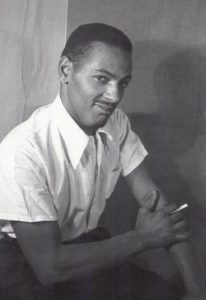
William Attaway
William Attaway was born on this date in 1911. He was a Black novelist, essayist, short story writer, playwright, screenwriter, and songwriter.
Born in Greenville, MS, William Alexander Attaway was the son of William S. Attaway, a medical doctor, and Florence Parry Attaway, a teacher of a peripatetic professional family. His older sister was Ruth Attaway. When William was six, his family moved to Chicago, where young Attaway attended a vocational high school, planning to become an auto mechanic. One day, in English class, he read a poem by Langston Hughes. After discovering that Hughes was a black poet, he began applying himself more deeply in his school work. He soon did some scriptwriting for his sister Ruth’s amateur dramatic groups.
Upon graduating from high school, Attaway enrolled at the University of Illinois, where he was a tennis college champion. His father's death forced him to drop out of college and become a traveling worker for two years. He moved around the country as a seaman, salesman, and labor organizer. It was during these years that he began gathering material for his later writing.
In 1935, Attaway helped write the Federal Writers' Project guide for the state of Illinois and became friends with Mississippi writer Richard Wright. Later that year, Attaway returned to the University of Illinois, received his degree, and moved to New York City. His drama “Carnival” was produced about this time.
In 1936, Attaway published his first story, "Tale of the Blackamoor." He worked odd jobs and even tried acting with his sister Ruth, who became a successful Broadway actress. His literary career truly began under the tutelage of his sister. In 1939, while performing with the traveling production of Moss Hart and George S. Kaufman's “You Can't Take It With You,” he learned that his first novel, “Let Me Breathe Thunder,” had been accepted for publication. With a two-year grant from the Julius Rosenwald Fund, Attaway began work on his next novel, “Blood on the Forge,” published in 1941. Attaway's novels were well-received by critics but did not attract much public attention.
After "Blood on the Forge" was published, he did not write any more novels; instead, he wrote songs, books about music, and screenplays. In the 1950s, he began writing for radio, films, and TV. In 1957, he produced “Calypso Song Book,” a collection of songs. In 1967, he wrote “Hear America Singing,” a children's history of popular music in America. He also wrote songs for Harry Belafonte, including the famous "Day-O Banana Boat" song. He was married in the Belafonte home. Altogether, Attaway wrote over 500 songs.
Attaway was the first Black writer to write scripts for TV and films. He wrote for small-screen programs like Wide World and the Colgate Hour. He wrote A "Hundred Years of Laughter," an hour-long special on Black humor that aired in 1964. The hour-long special featured comedians Redd Foxx, Moms Mabley, and Flip Wilson in their first television appearances. Attaway lived with his wife, Frances, and his two children, Bill and Noelle, in Barbados for 11 years. His last years were spent in California writing screenplays. William Attaway died of cancer in June 1986.
The African American Desk Reference
Schomburg Center for Research in Black Culture
Copyright 1999 The Stonesong Press Inc. and
The New York Public Library, John Wiley & Sons, Inc. Pub.
ISBN 0-471-23924-0